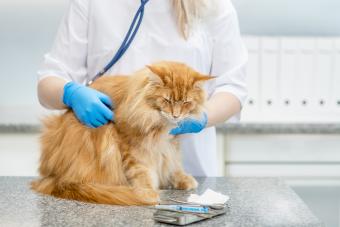
A cat can spend 30% to 50% of their waking hours grooming, according to the Cornell Feline Health Center. However, a cat grooming so excessively that it causes bald patches, areas of irritated skin, or open sores is a cause for concern. While it is very normal for a cat to groom themselves or other cats, when a cat begins to display signs of overgrooming, it's time to talk to your veterinarian and look for an underlying cause.
Is your cat overgrooming their belly, rear, or elbows? The area where the cat is licking can give clues as to the cause.
Why Do Cats Overgroom?
The reasons a cat overgrooms can be medical or behavioral, and it can sometimes be tricky to uncover which of these is causing your cat to lick excessively. The first step is to discuss the problem with your veterinarian. They will go over your cat's history with you to help figure out what is causing the problem. After the cause has been identified, treatment can be initiated. A medical reason for this behavior will have a very different treatment plan than one caused by a behavioral issue.
Overgrooming Due to Medical Issues
There are multiple medical causes of overgrooming.
Parasites
Flea allergies can cause a cat to overgroom, especially at the base of their back and tail. Other parasites, like mites and lice, can also cause skin irritation and hair loss. Though cat owners sometimes have concerns that worms are causing their cat to overgroom, this is not a common cause of overgrooming. However, cats can get tapeworms from ingesting a flea, so it is important to keep your cat flea-free to prevent tapeworms and overgrooming alike. Your veterinarian will screen your cat for parasites that you can't see, like the mites that cause mange, so you can figure out the best path forward.

Infectious Diseases
Ringworm is an infectious skin disease that can cause hair loss, itching, and overgrooming in cats. These are more common in outdoor cats, cats with compromised immune systems, or cats in large multi-cat situations (like shelters or rescue groups), but any cat (and person) can be susceptible. Your cat may be especially itchy around their ears or licking their elbows or paws if this is the root cause of their overgrooming, but cats can get ringworm anywhere on their bodies.
Pain
A cat may lick a specific area that is a source of pain for them. For example, a cat that is constipated may be licking around their hind end. If there is any sort of arthritis in the spine, they'll often lick mainly along the middle or upper part of their spine and might even cry when touched in this area. Your veterinarian will work with you to detect these subtle signs of pain and get your cat feeling comfortable again.
Allergies
Cats that lick at mainly their lower abdomen and the inside their back legs are more likely to be suffering from allergies, though parasites, pain, and infectious diseases should be ruled out before assuming it's the cause. Cats, like humans, can have allergies to fleas, food, and pollutants in the environment. They can even get seasonal allergies that cause skin irritation.
Overgrooming From Stress
Behavioral overgrooming is called "psychogenic alopecia." Alopecia means hair loss from part or parts of the body, and psychogenic means something is happening from a psychological cause rather than a physical one.
In cats, psychogenic alopecia is caused by stress. Since grooming releases endorphins, cats will groom in order to calm themselves. Finding the cause of the cat's stress is not always easy and usually requires the help of a veterinarian or an animal behaviorist, but anything that reduces stress and increases your cat's sense of calm can help.
How to Stop a Cat From Overgrooming
The strategies to stop a cat from overgrooming will depend on what is causing your cat to lick excessively. A medical reason for this behavior will have a much different treatment plan than one caused by a behavioral issue. The difficult part is finding the underlying cause.
Medical Treatments
Your veterinarian is your best partner in helping your cat stop overgrooming and get comfortable again. Even if your cat is overgrooming due to stress, it's important to rule out potential medical causes first, as the problem will stay the same or worsen if not treated properly.

- Fleas and other parasites: If your cat is overgrooming from fleas, then using flea control should resolve this issue. Other parasites are harder to detect and treat and may require medications from your veterinarian.
- Allergies: If allergies are the issue, your veterinarian may want you to try a different food or start your cat on antihistamines. In difficult cases, you may need to consult a veterinary dermatologist. They may recommend a steroid injection to give your cat some relief.
- Infectious Disease: Your veterinarian can perform a skin scrape procedure or a fungal culture to rule out ringworm or other infections.
- Pain: Your veterinarian will need to do a full physical exam and blood work to rule out metabolic causes for pain. X-rays can detect arthritis and some forms of spinal disease. Treating the source of the pain with anti-inflammatories and other appropriate medications or supplements can stop the overgrooming.
Reducing Stress to Stop Overgrooming
The behavioral treatment of overgrooming is more complicated since there are seemingly endless factors that can cause a cat to be stressed. What causes stress for one cat may not cause any issues for another. Removing the stressor is the key.

There are some general treatments to help reduce stress in a cat who is overgrooming for behavioral reasons:
Provide Gentle Enrichment
Interactive toys or games, as well plenty of one-on-one time with your cat will help them feel calmer.
Create Plenty of "Safe" Places
Provide private spaces for your kitty and areas where they can get up high, such as cat trees. Make sure they have plenty of places to curl up and nap.
Provide One Litter Box for Every Cat
Litter box stress can manifest in different ways, so make sure you provide options in a multicat household. Products like Feliway used around the litter boxes on as a collar on the overgrooming cat can help ease stress as well.
Stick to a Routine
Most cats don't like change, so try to keep this minimal. Try to feed your cat at the same time each day, and don't move the food bowls around too much.
In the most extreme cases of behavioral overgrooming, your cat may need anti-anxiety medication in addition to the suggestions above. This doesn't mean your cat has to stay on the medication forever. The goal is always to wean them off the medication as they adapt to the environment.
A Permanent Cure for Overgrooming
Medical causes for overgrooming have the best outcome for a permanent cure, as cats with behavioral causes for their excessive licking will have symptoms that wax and wane. Speak to your veterinarian, and together you can come up with a plan to combat your cat's overgrooming. You're your cat's best hope of getting back to comfortable — no matter what the reason.







